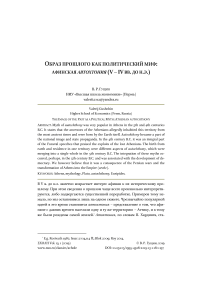Образ прошлого как политический миф: афинская автохтония (V-IV вв. до н.э.)
Автор: Гущин Валерий Рафаилович
Журнал: Schole. Философское антиковедение и классическая традиция @classics-nsu-schole
Рубрика: Статьи
Статья в выпуске: 1 т.13, 2019 года.
Бесплатный доступ
В V в. до н.э. чрезвычайно популярным становится миф об автохтонии - представление о том, что афиняне с давних времен населяли одну и ту же территорию - Аттику, и к тому же были рождены самой землей. Автохтония становится для афинян предметом особой гордости и даже частью национального имиджа и государственной пропаганды. В IV в. до н.э. упоминание о ней становится неотъемлемой частью надгробных речей, восхвалявших подвиги погибших афинян. Рождение землей и давность проживания на одной территории первоначально были различными аспектами рождающегося мифа (или отдельными мифами), объединившимися в одно целое в V в. до н.э. Объединение этих ранее независимых мифов чаще всего связывается с процессом формированием демократии. На наш взгляд, появление подобных представлений в большей мере было следствием греко-персидских войн и обретения Афинами статуса империи ( архэ ).
Афины, мифология, платон, автохтония, геродот, еврипид
Короткий адрес: https://sciup.org/147215797
IDR: 147215797 | DOI: 10.25205/1995-4328-2019-13-1-180-197
Список литературы Образ прошлого как политический миф: афинская автохтония (V-IV вв. до н.э.)
- https://nsu.ru/classics/schole/13/13-1-gush.pdf
- Гигаури, Д.И., Гуторов, В.А. (2017) "Политический миф в структуре исторической памяти", Вестник МГУ. Серия 12. Политические науки, 24-45.
- Гущин, В.Р. (2018) "Тезей и установление демократии в Афинах", Pentekontaetia. Исследования по античной истории и культуре. Под ред. О.Л. Габелко, А.В. Махлаюка, А.А. Синицына. Москва-С.-Петербург, 44-49.
- Кнабе, Г.С. (1993) Материалы к лекциям по общей теории культуры и культуре античного Рима. Москва.
- Ковалева, И.И. (2004) "Эрихтоний: миф в структуре Панафиней", Вестник древней истории 4, 129-134.
- Blok, J.H. (2009) "Gentrifying Genealogy: On the Genesis of the Athenian Autochthony Myth", U. Dill & Chr. Walde, eds. Antike Mythen. Medien, Transformationen, und Konstruktionen. Berlin, 251-275.
- Carey, C. (2007) "Epideictic Oratory", I. Worthington, ed. A Companion to Greek Rhetoric. Wiley-Blackwell, 236-252.
- Сohen, D. (2000) The Athenian Nation. Princeton.
- Connor, W.R. (1993) "The Ionian Era of Athenian Civic Identity" Proceedings of the American Philosophical Society 137, 194-206.
- Connor, W.R. (1994) "The Problem of Athenian Civic Identity", A.L. Boegohold, A.C. Scafuro., eds. Athenian Identity and Civic Ideology. Baltimore, 34-44.
- Engels, D. (2012) "Irony and Plato's Menexenus", L'Antiquité Сlassique 81, 13-30.
- Forsdyke, S. (2012) "‘Born from the Earth': The Political Uses of an Athenian Myth", Journal of Ancient Near Eastern Religions 12, 119-141.
- Frangeskou, V. (1999) "Tradition and Originality in Some Attic Funeral Orations", Classical World 92, 315-336.
- Grethlein, J. (2006) "The Manifold Uses of the Epic Past: the Embassy Scene in Herodotus 7.153-63", American Journal of Philology 127, 485-509.
- Gruen, E.S. (2010) Rethinking the Other in Antiquity. Princeton.
- Hall, J.M. (1997) Ethnic Identity in Greek Antiquity. Cambridge.
- Harding, P. (2008) The Story of Athens. The fragments of the local chronicles of Attika. London.
- Hölscher, T. (2008) "Images and Political Identity: The Case of Athens", P. Low, ed. The Athenian Empire. Edinburgh.
- Immerwahr, H.R. (1973) "Pathology of Power and the Speeches in Thucydides", P.A. Stadter, ed. The Speeches in Thucydides. Chapel Hill, 16-31.
- Isaac, B. (2004) The Invention of Racism in Classical Antiquity. Princeton.
- Kearns, E. (1989) The Heroes of Attica. Bulletin of the Institute of Classical Studies. Supplement 57. London.
- Laird, A.G. (1933) "Herodous on the Pelasgians in Attica", American Journal of Philology 54, 97-119.
- Lape, S. (2010) Race and Citizen Identity in the Classical Athenian Democracy. Cambridge.
- Leão, D.F. (2012) "The Myth of Autochthony, Athenian Citizenship and the Right of Enktesis: A Legal Approach to Eripides' Ion", B. Legras & G. Thür, hrsg. Symposion 2011. Vorträge zur griechischen und hellenistischen Rechtsgeschichte. Wien, 135-152.
- Loraux, N. (1979) "L'autochtonie: un topique athénienne. Le Myth dans l'espace civique", Annales E.S.C 34, P.3-26.
- Loraux, N. (1993) The Children of Athena. Athenian Ideas about Citizenship and the Division Between the Sexes. Princeton.
- Loraux, N. (2000) Born of the Earth. Myth and Politics in Athens. Ithaca and London.
- Nielsen, T.H. (1999) "The Concept of Arkadia - The People, their Land, and their Organization", T.H. Nielsen & J. Roy, eds. Defining Ancient Arkadia. Acts of the Copenhagen Polis Centre. Vol. 6. Copenhagen, 16-79.
- Parker, R. (1987) "Myths of Early Athens", J. Bremmer, ed. Interpretation of Greek Mythology. London, 187-214.
- Pelling, C. (2009) "Bringing Auochthony Up-to-Date: Herodotus and Thucydides", Classical World 102, 471-483.
- Rhodes, P.J. (1993) A Commentary on the Aristotelian Athenaion Politeia. Oxford.
- Rosivach, V.J. (1977) "Earthborns and Olympians: the Parods of the Ion", Classical Quarterly 27, 284-294.
- Rosivach, V.J. (1987) "Autochthony and the Athenians", Classical Quarterly 37, 294-306.
- Roy, J. (2011) "On seeming backward: how the Arkadian did it", S. Lambert, ed. Sociable Man. Essays on Ancient Greek social behaviour, in honour of N. Fisher. Swansea, 62-85.
- Roy, J. (2014) "Autochthony in Ancient Greece", J. McInerney, ed. A Companion to Ethnicity in the Ancient Mediterranean. Wiley-Blackwell, 256-269.
- Saxonhause, A.W. (1986) "Myths and the Origins of Cities: Reflection on the Authоchthony Theme in Euripides' Ion", J.P. Euben, ed. Greek Tragedy and Political Theory. Berkeley & Los Angeles, 252-273.
- Shapiro, H.A. (1998) "Autochthony and the Visual Arts in the 5th century Athens", D. Boedeker, K. Raaflaub, eds. Democracy, Empire and the Arts in Fifth-Century Athens. Cambridge (Mass.), 127-151.
- Sourvinou-Inwood, C. (2003) "Herodotus (and others) on Pelasgians: Some Perception of Ethnicity", P. Derow & R. Parker, eds. Herodotus and his World. Oxford, 103-144.
- Thomas, R. (2000) Herodotus in Context. Ethnography, Science and the Art of Persuasion. Cambridge.
- Thomas, R. (2001) "Ethnicity, Genealogy and Hellenism in Herodotus", I. Malkin, ed. Ancient Perception of Greek Ethnicity. Washington.
- Tsitsiridis, P. (1998) Platons Menexenos: Einleitung, Text und Kommentar. Stuttgart.
- Wickkiser, B.L. (1999) "Speech in Context: Plato's "Menexenus" and the Ritual of Athenian Public Burial", Rhetoric Society Quarterly 29, 65-74.
- Zacharia, K. (2003) Converging Truths: Euripides’ Ion and the Athenian Quest for Self-Definition. Mnemosyne Suppl. 242. Leiden-Boston.


